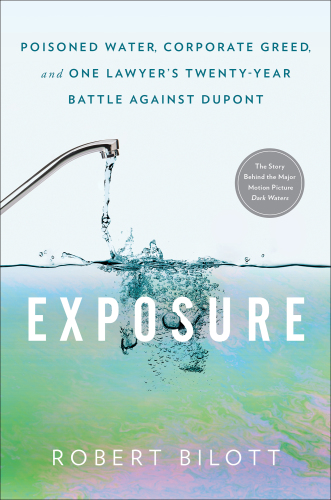
Exposure
Poisoned Water, Corporate Greed, and One Lawyer's Twenty-Year Battle against DuPont
کتاب های مرتبط
- اطلاعات
- نقد و بررسی
- دیدگاه کاربران
نقد و بررسی

September 15, 2019
An environmental lawyer recounts the two-decade-long saga of U.S. residents being poisoned by drinking water contaminated with toxic chemicals used in the production of Teflon. A young corporate attorney in Cincinnati as the narrative opens in 1996, Bilott explains his progression from defending corporate polluters to advocating for plaintiffs being denied justice by the multinational chemical manufacturer DuPont. Although the narrative eventually becomes dominated by arcane legal procedures and complicated chemistry, it opens powerfully as Bilott receives an unusual telephone call from Earl Tennant, a farmer on a modest acreage near Parkersburg, West Virginia. Tennant understood implicitly that some toxic substance was killing his cows and causing illness in his family, but nobody in West Virginia would listen, including the state environmental protection agency. Tennant was acquainted with Bilott's grandmother, who provided him with the author's phone number in Cincinnati. Though Bilott felt he could not accept Tennant as a client, for a multitude of reasons, he met with him at the farm, immediately sensed an injustice, and risked his career at his law firm to represent the Tennant family. Eventually, that one case mushroomed into a class-action lawsuit on behalf of tens of thousands of plaintiffs harmed by the toxic discharges emanating from DuPont's factory. Bilott is obviously an advocate, so his treatment of DuPont's scientists, lawyers, and top executives should be read with caution. Still, his level of detail leaves little doubt that year after year, the corporation misled government agencies, courts, and consumers into a false sense of security about the poisonous nature of their manufacturing processes. Bilott shares candid details about his own insecurities within his law firm as well as his failures as a husband and a father stemming from his workaholic nature. Bilott's admirable crusade is widely known thanks to coverage by journalists; this book adds plenty of detail and further context.
COPYRIGHT(2019) Kirkus Reviews, ALL RIGHTS RESERVED.

October 1, 2019
In 2016, the New York Times Magazine profiled corporate attorney Bilott's painstaking efforts to hold DuPont accountable for widespread chemical pollution. Now, Bilott has written a meticulously detailed account of that legal battle. Bilott is an engaging writer, and this work reads like a combination legal thriller and court deposition. What began in 1998 as a case of a single West Virginia farmer against a giant corporation led to a successful class action lawsuit against DuPont. In 2017, DuPont finally agreed to a $671 million settlement, solely for the area around Parkersburg, WV, where farmer Wilbur Tennant's cattle were dying. The culprit in this massive pollution was a series of compounds known as PFOA that are crucial to the production of Teflon and other nonstick surfaces. Bilott recalls the tedious process of legal discovery and maneuvering, revealing DuPont's aggressive, intimidating actions and diversionary tactics until, ultimately, justice prevails. Along the way, Bilott relates the toll the case takes on his personal life, his narrative grounded in a strong sense of place as he develops close ties with the residents of the small Ohio and West Virginia communities impacted by the pollution. VERDICT An important account that readers interested in the environment and corporate malfeasance will devour.--Thomas Karel, Franklin & Marshall Coll. Lib., Lancaster, PA
Copyright 2019 Library Journal, LLC Used with permission.

Starred review from October 15, 2019
In the grand tradition of Jonathan Harr's A Civil Action (1995), lawyer Bilott presents his own real-life legal thriller about taking on a gigantic corporation guilty of poisoning a West Virginia community's water supply and covering up the crime. This particular case had national consequences, as Bilott's foe was DuPont, and the poison was an unregulated and critical chemical component of Teflon, perfluorooctanoic acid, or PFOA. In a classic case of corporate villainy, DuPont was determined to protect its interests, regardless of the human cost. It all fell apart owing to Bilott's dogged refusal to turn away, and as he tells the story behind this massive environmental crime, readers will be riveted. From his opening chapter about a favor for his grandmother, which leads the corporate lawyer to accept a small case involving a cattle rancher with dying cows, through the ensuing years as DuPont seeks to outmaneuver him, Bilott battles paperwork, and the rancher becomes increasingly ill. Bilott writes of his worries as the case draws him away from his young family, but he refuses to give up. The story is smartly told and briskly paced, with keen attention to pertinent details; expect lots of interest as toxic-water issues and lawsuits multiply across the country.HIGH-DEMAND BACKSTORY: Requests will zoom with the forthcoming movie adaptation starring Anne Hathaway and Mark Ruffalo.(Reprinted with permission of Booklist, copyright 2019, American Library Association.)

























دیدگاه کاربران